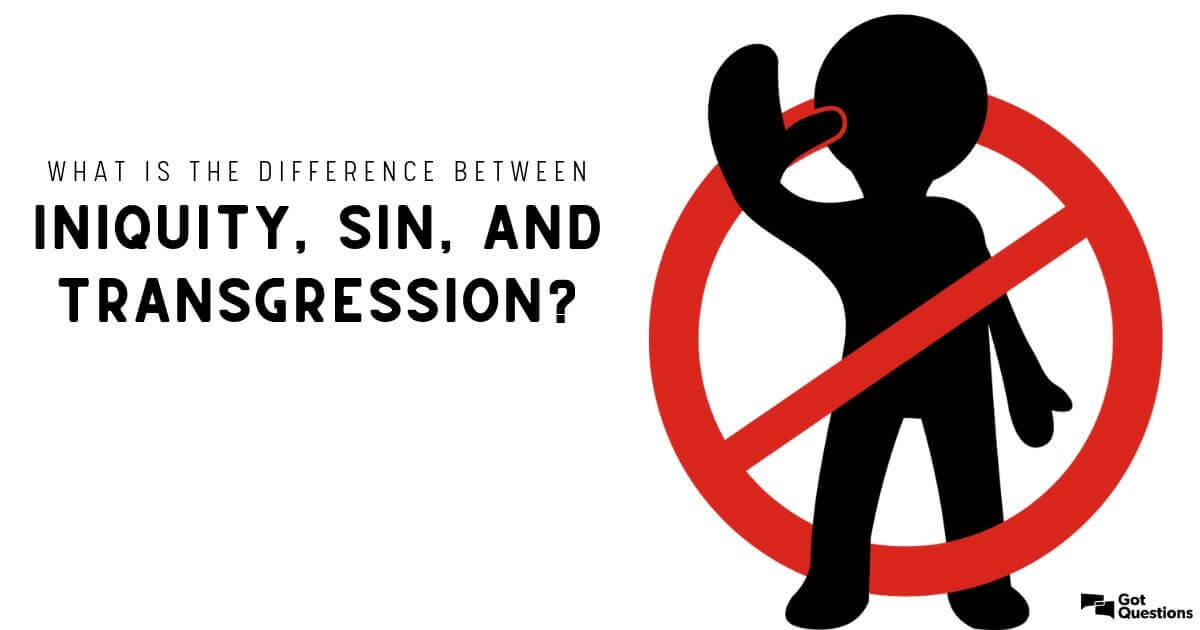I just wanted to share this from the author of Got Questions Ministries:
 SIN:
SIN:
In Psalm 32:5, the psalmist says, “I acknowledged my sin to you and did not cover up my iniquity. I said, ‘I will confess my transgressions to the LORD.’” In this one verse, “sin,” “iniquity,” and “transgression” are all mentioned. Basically, the three words communicate the same idea: evil and lawlessness, as defined by God (see 1 John 3:4). However, upon closer examination, each word also carries a slightly different meaning.
The word sin and its cognates are used 786 times in the New International Version of the Bible. Sin means “to miss the mark.” It can refer to doing something against God or against a person (Exodus 10:16), doing the opposite of what is right (Galatians 5:17), doing something that will have negative results (Proverbs 24:33–34), and failing to do something you know is right (James 4:17). In the Old Testament, God even instituted sacrifices for unintentional sins (Numbers 15:27). Sin is the general term for anything that “falls short of the glory of God” (Romans 3:23).
Sin leads to a downward progression that, without the restoring power of the Holy Spirit, we all tend toward. The sin nature is present in every human being born since the Fall of Adam (Genesis 3:6–7; Romans 5:12). If left unchecked, continual sin leads to a “reprobate mind,” spoken of in Romans 1:24. Our sin nature causes us to gravitate naturally toward selfishness, envy, and pride, even when we are trying to do good. The apostle Paul alluded to his propensity to sin when he wrote, “For I know that good itself does not dwell in me, that is, in my sinful nature. For I have the desire to do what is good, but I cannot carry it out” (Romans 7:18).
The sin nature leads to trespassing. A trespasser is someone who crosses a line or climbs a fence that he should not cross or climb. A trespass may be intentional or unintentional. Trespass can also mean “to fall away after being close beside.” Peter trespassed when he denied Jesus (Luke 22:34, 56–62). We all “cross the line” in thought, word, or attitude many times a day and should be quick to forgive others who do the same (Matthew 6:15).

What is the difference between iniquity, sin, and transgression? | GotQuestions.org
What is the difference between iniquity, sin, and transgression? Why does the Bible use different terms to refer to sin?
www.gotquestions.org
In Psalm 32:5, the psalmist says, “I acknowledged my sin to you and did not cover up my iniquity. I said, ‘I will confess my transgressions to the LORD.’” In this one verse, “sin,” “iniquity,” and “transgression” are all mentioned. Basically, the three words communicate the same idea: evil and lawlessness, as defined by God (see 1 John 3:4). However, upon closer examination, each word also carries a slightly different meaning.
The word sin and its cognates are used 786 times in the New International Version of the Bible. Sin means “to miss the mark.” It can refer to doing something against God or against a person (Exodus 10:16), doing the opposite of what is right (Galatians 5:17), doing something that will have negative results (Proverbs 24:33–34), and failing to do something you know is right (James 4:17). In the Old Testament, God even instituted sacrifices for unintentional sins (Numbers 15:27). Sin is the general term for anything that “falls short of the glory of God” (Romans 3:23).
Sin leads to a downward progression that, without the restoring power of the Holy Spirit, we all tend toward. The sin nature is present in every human being born since the Fall of Adam (Genesis 3:6–7; Romans 5:12). If left unchecked, continual sin leads to a “reprobate mind,” spoken of in Romans 1:24. Our sin nature causes us to gravitate naturally toward selfishness, envy, and pride, even when we are trying to do good. The apostle Paul alluded to his propensity to sin when he wrote, “For I know that good itself does not dwell in me, that is, in my sinful nature. For I have the desire to do what is good, but I cannot carry it out” (Romans 7:18).
The sin nature leads to trespassing. A trespasser is someone who crosses a line or climbs a fence that he should not cross or climb. A trespass may be intentional or unintentional. Trespass can also mean “to fall away after being close beside.” Peter trespassed when he denied Jesus (Luke 22:34, 56–62). We all “cross the line” in thought, word, or attitude many times a day and should be quick to forgive others who do the same (Matthew 6:15).

